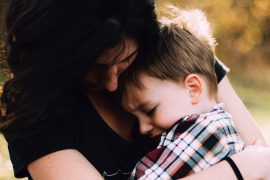Broken Dreams
Often, what knocks mothers into a depression is that some fundamental emotional needs surrounding pregnancy, the birth of her child, and the day-to-day life of mothering are not being met. She may not even know how to validate these needs herself. The moment her baby comes, when her need for support is most acute, she finds herself alone for hours at a time, faced with a baby who wails for her attention. For many mothers, when they are alone, the day can drag on interminably. The task of mothering, along with her babies’ natural, healthy but unceasing calls for attention ends up feeling like a terrible burden. It was all supposed to feel wonderful, instead it feels like tedium. She expected to be bathed in joy, instead she finds herself struggling. She feels shocked; her illusions about mothering are dashed, and she blames herself. No one told her it was going to feel like this.
It was all supposed to feel wonderful, instead it feels like tedium. She expected to be bathed in joy, instead she finds herself struggling.
To make matters worse, her friends and family keep telling her how lucky she is, and how happy she should be. This makes her feel even more isolated, more ashamed, as if there must be something wrong with her. The worst aggravator for a mother is to be told she is being irrational. Such an un-empathic comment, at a time of emotional vulnerability, can be shattering.
It needn’t be this way. Our culture fails mothers. In modern Western cultures, few parents belong to supportive family or tribe-like groups. Mothers are supposed to be surrounded by help and assistance, offered enduring empathy and validation, as well as given a little of their own space from time to time. Few enjoy these conditions. Furthermore, a mother’s social status is ranked lowest in our culture. She feels unimportant, secondary, unwanted. Are these kinds of circumstances not reason enough to feel depressed? That’s exactly what they do differently in cultures where PND does not exist. Kipsigi mothers receive abundant social support throughout pregnancy and post-natally.
Mothers are supposed to be surrounded by help and assistance, offered enduring empathy and validation, as well as given a little of their own space from time to time. Few enjoy these conditions.
There are many more causes beyond those listed herein, as many as there are sufferers. A one-size-fits-all diagnosis can shut the door on empathy and understanding. We have dangerously underestimated women’s emotional needs surrounding pregnancy, childbirth and mothering – so much so that much of what we consider ‘normal’ and unremarkable is in fact traumatic. We undervalue maternal needs for support, empathy and practical help at a great cost to families. If we are to reduce, even eliminate the incidence of PND, then there is much more to be done to ensure that mothers’ psychological needs are taken care of, throughout the parenting journey.
This article originally appeared in Issue #4 of The Natural Parent Magazine, 2011.
Robin Grille is a Sydney based psychologist, and author of Parenting for a Peaceful World (Longueville Media, 2005) and: Heart to Heart Parenting (ABC Books, 2008). For more information, visit: www.our-emotional-health.com










